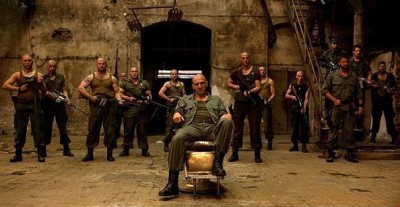| Reviews & Columns |
|
Reviews DVD TV on DVD Blu-ray 4K UHD International DVDs In Theaters Reviews by Studio Video Games Features Collector Series DVDs Easter Egg Database Interviews DVD Talk Radio Feature Articles Columns Anime Talk DVD Savant Horror DVDs The M.O.D. Squad Art House HD Talk Silent DVD
|
DVD Talk Forum |
|
|
| Resources |
|
DVD Price Search Customer Service #'s RCE Info Links |
|
Columns
|
|
|
Coriolanus

Ralph Fiennes first played the role of Coriolanus on the London stage nearly a dozen years ago, and appears to have been unable to shake it--it stayed with him for all of this time, and here we have, as his feature film directorial debut, a film adaptation of the play. It's not hard to guess why he wanted to immortalize his performance on film; it's a decathlon for the already intense thespian, full of giant acting arias. Every word spoken to the Roman peasants drips with acidic indifference ("Get you home, you... fragments"), and when he has had enough of their accusations, his speech is powerful, rafter-shaking even--nearly as terrifying as the quiet chilliness of his proposal to ally himself with his enemy. But this isn't a book-on-tape turn, the way some actors play their Shakespeare; his is a powerfully physicalized characterization, and even in his dialogue scenes, he's like a coiled snake about to strike.
Still, it's not merely an actor's showcase; there are surely scores of experienced directors who'd have helmed the film for him. Fiennes proves a robust and energetic filmmaker, and his staging (of, admittedly, one of the Bard's lesser-known works) is ingenious. To start, he's done in it in modern dress, but it's not an arbitrary, cosmetic move--though it does have the kick of a particularly ingenious adaptation (similar to Luhrman's Romeo + Juliet or Almereyda's Hamlet, whose transposition of the "get thee to a nunnery speech" into an answering machine message still gives me a grin). No, this is an interpretation that couldn't feel more timely and appropriate, with (perhaps intentional, perhaps accidental) allusions to the Tea Party, Congressional dysfunction, and the Occupy movement that land without the clumsiness that so often batters political cinema.
Those overtones noted, Fiennes isn't creating a polemic here; he and screenwriter John Logan (the increasingly-busy scribe behind Rango, Hugo, and the next Bond movie) reinvent Shakespeare's historical tragedy as a tough, muscular action movie, set in a war-torn Rome that looks more like 2005 Baghdad. The story is told (in the early stretches, anyway) primarily in short, crisp scenes, boiling down Shakespeare's narrative into expositionary bursts and lean action beats. It's a strategy that works, somewhat surprisingly--the creator of the contemporary retelling is often stuck with graceless transitions and awkwardly wordless scenes, but we're not used to a lot of talking in a gruesome knife fight, or in Fiennes's scene of hand-to-hand combat with Gerald Butler. It may not have all that much to do with Shakespeare, but as an audience, we're not terribly bothered.
The rather brilliant turn of the second half--in which exiled and disgraced Coriolanus (Fiennes) offers himself up as a soldier to his sworn enemy (Butler)--is distinctively modern as well, a bit of classic revenge storytelling that works like a charm. The only trouble (and the film's only genuine flaw) is that there is a rhythmic shift in that second hour as well; the scenes run much longer than in the first, which puts a drag on the pacing and makes the film feel a bit longer than it is. This is not to suggest that it all had to run at the rat-tat-tat pace of those introductory scenes--merely that some kind of a middle ground might have been advisable.
But even when the energy flags, Fiennes and his cast impress. Butler's characterization is less complicated, but blunt and effective--his is a performance of brute force and raw emotion, and it works. Brian Cox is magnificent (of course), playing this Shakespearean dialogue like a concert pianist. And then there is Vanessa Redgrave, who is astonishingly good in a multi-layered turn: ruthlessly pragmatic in one scene, tough as nails in the next, culminating in a face-off with her son in which she serves up a potent elixir of righteous indignation and maternal guilt. Hers is a stop-the-presses performance, and one of many wise decisions that Fiennes made in assembling a first-rate directorial debut.
Jason lives in New York. He holds an MA in Cultural Reporting and Criticism from NYU.
|
| Popular Reviews |
| Sponsored Links |
|
|
| Sponsored Links |
|
|
| Release List | Reviews | Shop | Newsletter | Forum | DVD Giveaways | Blu-Ray | Advertise |
|
Copyright 2024 DVDTalk.com All Rights Reserved. Legal Info, Privacy Policy, Terms of Use,
Manage Preferences,
Your Privacy Choices | |||||||











